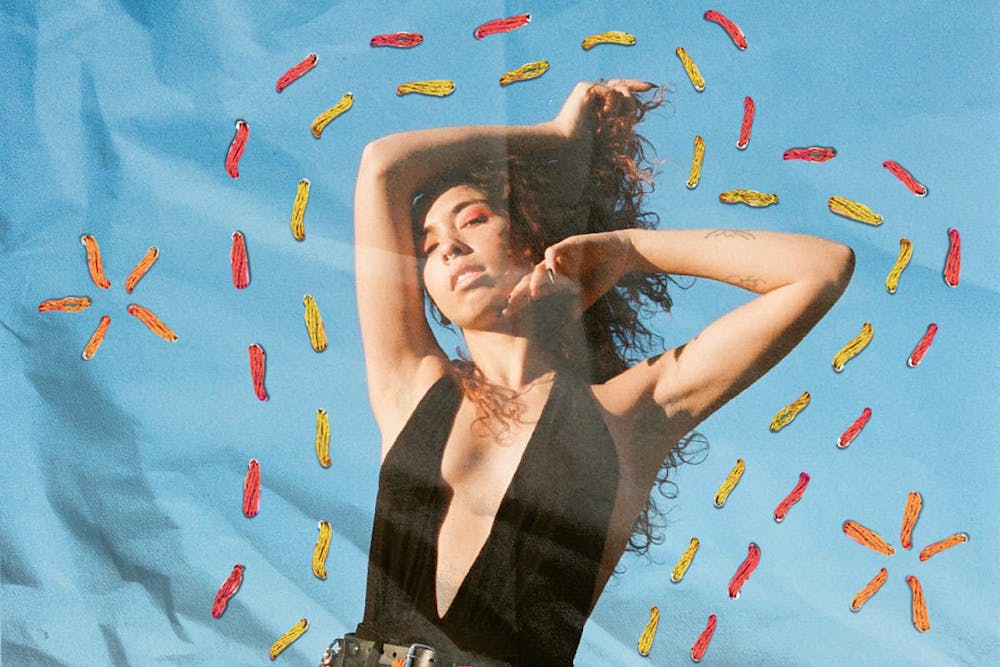When I meet Indigo De Souza for the first time through the lens of a brief but meaningful Zoom session, she lounges in a desk chair in her drummer’s house. In the room behind her sit piles of cardboard boxes, presumably filled with essentials for her upcoming tour. A week away from the start of a string of dates with indie rock princess Lucy Dacus, De Souza reflects on her childhood, the music that raised her, and the anxious excitement of life on the road.
De Souza isn't a novice when it comes to expressing her feelings through music. The artist was raised in Spruce Pine, NC, a small conservative town with a population of just over 2,000 people. At the age of nine, she began making music, often traveling with her mother to nearby Asheville to busk on the streets and perform in coffee shops. As the only biracial kid in school, De Souza often bore the brunt of stares and snarky remarks from her classmates. “[Spruce Pine] was really limited in all the ways that a small country town can be,” says De Souza.
At 16 years old, De Souza moved to Asheville with her older sister. In Asheville, De Souza was no longer isolated by her differences; instead, she was celebrated for her creativity, talent, and hippie upbringing. It was in Asheville where De Souza began to truly experiment with music and launch her career without conforming for the sake of others. She met a songwriter with whom she was in a relationship for four years. This person “changed [De Souza’s] landscape musically” and introduced her to songwriting techniques, melody, and her favorite artist of all time, Arthur Russell.
“Hold U,” De Souza’s closest thing to a pure pop smash, is a celebration of queer love and the more accepting community she found during her teenage years in Asheville. De Souza recognizes self–love and love for another person through simple yet powerful lyrics: “I am a good thing and I promise you got me / And I would go anywhere with you.” The song's music video conveys the deep connections transmitted through intimacy in touching limbs, hair, and hands. De Souza and her friends honor their love in an electric club scene, dramatically lip–syncing the heartfelt bridge, “I’m not the only body / I’m not the only one,” while emitting contagious joy.
There's no limit to De Souza’s musical artistry. Her indie psychedelic–rock sound is one of a kind, and her lyricism embraces uncomfortable feelings with open arms. De Souza’s first album, I Love My Mom, which was re–released by Saddle Creek Records in 2021, explores themes of heartbreak, mortality, and platonic love. Her sophomore album, Any Shape You Take, released the same year, is De Souza’s musical journal, a tribute to love’s strengths and weaknesses, desperation, and raw pain. De Souza extracted the album title from the heartfelt lyrics of “Way Out:” “No matter what shape you might take / I’ll love you anyway.”
Any Shape You Take is an album filled with emotional twists and turns. “Real Pain,” De Souza's favorite song from the album, is a testament to leaning into pain despite how difficult it feels. When asked why she values this song so deeply, De Souza says, “I wanted to say that if you are feeling pain, and you don't let [it] in…then it will not go away.” For the midsection of the song, De Souza collected voice recordings from her fans screaming and yelling—confronting emotion in its truest form.
An especially interesting element of Any Shape You Take is De Souza’s repetition of lyrics, a common songwriting technique throughout the album. Sometimes, it seems that De Souza repeats certain phrases to assure herself that they’re true. Opener “17” emulates the experience of grieving and accepting the end of a relationship. “This is the way I’m going to bend / Now that the baby’s gone,” she repeats, seemingly convincing herself that she can bend through these feelings until they pass.
De Souza’s music stands out not only through her powerful vocals and vulnerable lyricism but also by the distinctive album art created by her mother. On the cover of Any Shape You Take, a mother pulls her child in a shopping cart through a kaleidoscopic scene of colors and patterns. Both the mother and child are fantastical creatures with human bodies and skeleton–like faces. The cover of this album and I Love My Mom were De Souza’s visions that her mother transformed into art. De Souza gripes about the lack of exposure to her mother’s artistic talent, as she's always “manically creating art,” but nobody ever sees it.
De Souza began touring with Dacus on Feb. 9, 2022, for her North American tour. Due to COVID–19 restrictions, this will be De Souza’s strictest tour yet. Besides sleeping and performing, De Souza and her crew will have little time to explore the cities they are visiting. “At first I was really nervous about [the restrictions], but now it seems like we've all come to terms with it,” De Souza says. “And we're like, ‘This is just gonna be a weird like experimental life where we're just stuck with only us and Lucy's bands and Lucy's touring party,’ and we'll just get to know them really well and play together.”
De Souza’s optimism about her untraditional tour perfectly reflects her calm and inviting presence. Her emotional transparency is crucial to her creative process, and her music invites listeners to relate and connect with her experiences. De Souza’s two records are products of years of dramatic change, searching for acceptance, and allowing herself to feel along the way.
Indigo De Souza is performing with Horse Jumper of Love and Friendship at Union Transfer on May 2, 2022, at 8 p.m. Doors open at 7 p.m.

